Pickleball’s skyrocketing popularity isn’t just about the fast-paced action and the thrill of the game; it’s also deeply rooted in the spirit of sportsmanship and respect. With players of all ages and backgrounds coming together, understanding the rules of conduct is key to keeping the game enjoyable for everyone.
The sport prides itself on fostering a friendly and inclusive environment. From casual backyard matches to high-stakes tournaments, knowing and adhering to the guidelines on player conduct ensures that every game ends with smiles, regardless of the score. Let’s dive into what makes pickleball more than just a game, but a community built on mutual respect and sportsmanship.
Understanding Player Conduct in Pickleball
In pickleball, player conduct is not just about following the technical rules of the game; it’s about fostering a community centered on respect and sportsmanship. This inclusive sport brings together players from diverse backgrounds and of all ages, creating a melting pot of skills and personalities on the courts. But at the heart of this diversity lies a unified commitment to uphold the spirit of the game through exemplary conduct.
Players are encouraged to exhibit honesty, integrity, and fairness in every match. This entails not only making truthful line calls but also giving opponents the benefit of the doubt in close situations. It’s this level of trust and respect that helps maintain the game’s friendly atmosphere, even in competitive settings.
Key Rules of Conduct
- Respect for Opponents: Always play fair and give credit where it’s due. Congratulate opponents on good shots and points well played.
- Self-Control: Keep emotions in check. Avoid outbursts or derogatory comments towards others.
- Positive Attitude: Encourage teammates and opponents alike. Negative comments or attitudes can diminish the enjoyment of the game for everyone.
- Sportsmanship Over Winning: While competition can be intense, remembering that sportsmanship is more valuable than winning maintains the game’s integrity.
Handling Disagreements
Disagreements on the court are inevitable, especially in matches where every point counts. The recommended approach is to discuss disputes calmly and come to a mutual agreement. If a consensus can’t be reached, players might replay the point to keep the game moving forward without hard feelings. This approach underscores the principle that the relationship between players is more important than any single point or game.
The Role of Spectators
Spectators also play a vital role in maintaining the positive atmosphere of pickleball matches. They’re encouraged to applaud good play and maintain neutrality, especially during competitive events. This support helps elevate the spirit of the game, making it enjoyable for players and spectators alike.
Encouragement and Improvement
Part of sportsmanship in pickleball involves helping others improve. More experienced players are often seen sharing tips with newcomers, not just about how to play better but how to play with honor. It’s this mentorship that keeps the pickleball community growing in a positive direction, ensuring that the sport remains welcoming to all who wish to join.
Importance of Sportsmanship in Pickleball
In the rapidly growing world of pickleball, sportsmanship stands as a cornerstone, defining the game far beyond the court’s boundaries. This emphasis on respectful and fair play enhances the game’s appeal, attracting a diverse group of enthusiasts eager to be part of a welcoming and friendly community. Players are not just participants; they are ambassadors of the sport, where each serve, volley, and point scored carries with it an unwritten obligation to uphold the highest standards of conduct.
The Role of Respect
Respect in pickleball transcends the basic courtesy extended to opponents. It’s about acknowledging the effort and skill of every player, regardless of their experience level. This mutual respect fosters a supportive environment that encourages everyone to put forth their best effort and enjoy the game. Spectators, too, play a crucial role by providing positive encouragement and refraining from any behavior that could detract from the inclusive atmosphere of the sport.
Maintaining Self-Control
Self-control is perhaps one of the most challenging aspects of sportsmanship to consistently apply. The competitive nature of pickleball can stir strong emotions, from the thrill of victory to the frustration of defeat. However, how players manage these emotions significantly impact their enjoyment and growth in the sport. Demonstrating self-control, including managing frustrations constructively and celebrating victories modestly, sets a powerful example for others and keeps the game enjoyable for all participants.
Fostering a Positive Attitude
A positive attitude goes a long way in pickleball, not only improving one’s own experience but also enhancing the game for others. Players who approach the game with enthusiasm, openness to learning, and a readiness to face challenges contribute significantly to the sport’s positive community spirit. This attitude inspires others, creating a cycle of positivity that benefits players, spectators, and the broader pickleball community.
Prioritizing Sportsmanship Over Winning
Victory on the court, while satisfying, is fleeting. The true essence of pickleball lies in the joy of participation, the camaraderie among players, and the shared experience of improving and enjoying the game together. Prioritizing sportsmanship over winning ensures that matches are played in the best spirit, where the outcome is secondary to the experience of fair competition, mutual respect, and the joys of a game well played.
Guidelines for Maintaining Respect on the Pickleball Court
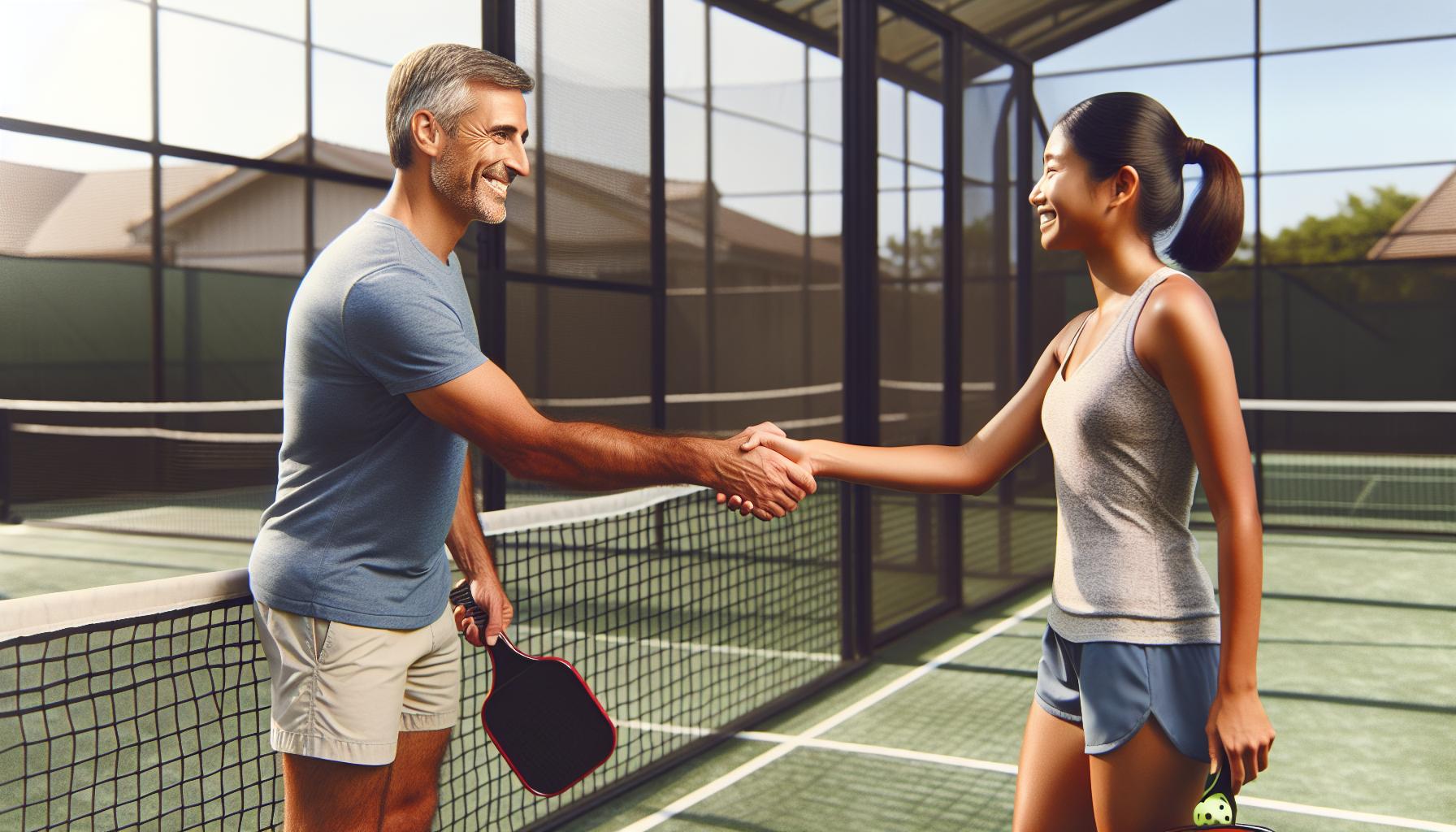
Maintaining respect on the pickleball court isn’t just about following the rules of the game; it’s about fostering a community spirit that celebrates sportsmanship and mutual appreciation. This begins with the recognition that every player, regardless of their skill level, deserves respect and understanding. In this friendly yet competitive atmosphere, a few key guidelines can help players ensure they’re contributing positively to the pickleball community.
Firstly, communication is foundational. Players should always engage in clear, respectful dialogue on and off the court. This encompasses calling out scores loudly and clearly, discussing line calls with honesty and without animosity, and acknowledging good shots from both teammates and opponents. Such interactions not only keep the game flowing smoothly but also build a rapport among players that transcends competitive rivalries.
Another crucial aspect is the control of emotions. Competitive sports, including pickleball, can evoke strong feelings. While it’s natural to feel passionate about the game, players must manage their emotions effectively. This means refraining from outbursts, resisting the urge to argue with officials or opponents, and instead channeling that energy into playing their best. Celebrations should be joyful yet modest, keeping the feelings of the opposing team in mind.
Here are a few important points to remember:
- Always shake hands or offer a gesture of goodwill towards opponents before and after matches.
- Avoid unsportsmanlike conduct, including excessive celebration or disparaging comments.
- Uphold integrity by following the rules, even in instances where a referee or official might not have a clear view of the play.
Spectator behavior also plays a significant role in maintaining respect on the court. Those watching the games should offer encouragement and applause for good play, irrespective of who makes the shot. It’s vital for spectators to avoid intervening in disputes or negatively impacting the players’ experiences through their actions.
Lastly, it’s important for all participants, including players, officials, and spectators, to understand and respect the cultural and individual differences among them. Pickleball is a game that invites diverse participation, and recognizing this diversity enriches the experience for everyone involved. From observing cultural sensitivities to accommodating physical limitations, the pickleball community thrives when inclusivity is a priority.
Prohibited Behaviors and Penalties in Pickleball
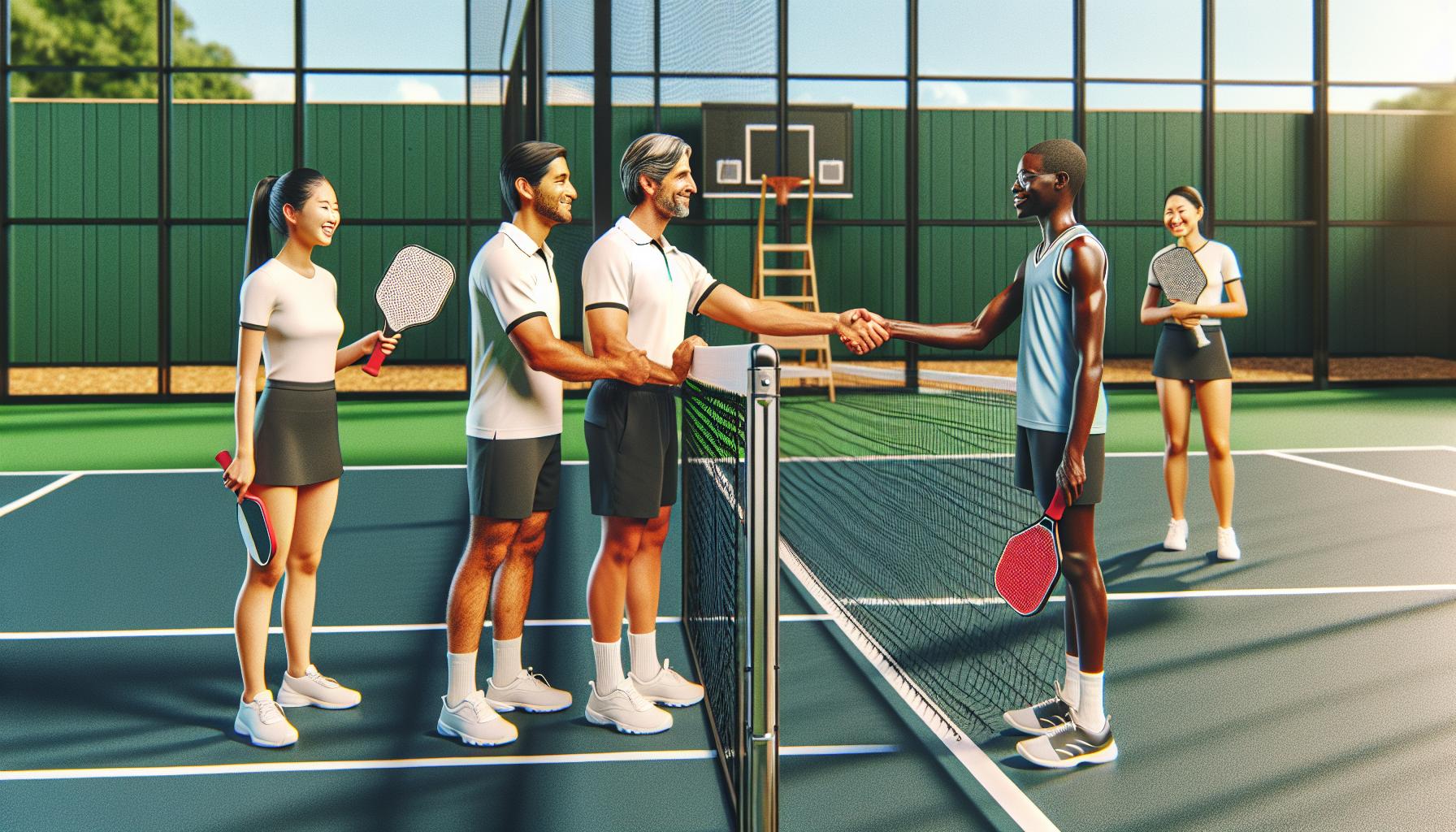
Pickleball, like any sport, has its code of conduct aimed at ensuring fair play, respect, and enjoyment for everyone involved. Awareness of prohibited behaviors and the corresponding penalties is crucial for all players to maintain the integrity of the game.
Understanding Prohibited Behaviors
Certain actions are considered unacceptable on the pickleball court. These include, but are not limited to:
- Unsportsmanlike conduct: This spans a range of behaviors from argumentative disputing of officials’ calls to inappropriate language or gestures.
- Disturbance: Making loud noises or movements that distract the opponent during play.
- Equipment misuse: Throwing paddles or balls in frustration or disrespect.
- Delay of game: Intentionally wasting time between points.
It’s not just the actions during the game that matter but also how players conduct themselves before and after matches. Respecting both fellow players and spectators is paramount.
Penalties for Non-compliance
When players fail to adhere to the expected standards of behavior, they face certain penalties. These are typically enforced by officials and can vary depending on the severity of the misconduct. The common penalties include:
| Action | Penalty |
|---|---|
| First Minor Offense | Warning |
| Repeated Minor Offenses | Point Penalty |
| Major Offense | Game Forfeit or Disqualification |
Officials have the discretion to determine the severity of an offense and impose penalties accordingly. In tournaments, the Pickleball Tournament Committee may also review severe cases of misconduct, potentially leading to further sanctions such as suspension from future events.
Role of Officials in Enforcing Conduct
Officials play a key role not only in overseeing the gameplay but also in enforcing conduct rules. They’re trained to recognize and address unsportsmanlike behavior effectively while maintaining a positive atmosphere on the court. Their decisions are final and must be respected by all participants.
The Importance of Self-regulation
While officials are responsible for maintaining order, players are expected to self-regulate their behavior. Recognizing when emotions are running high and taking steps to calm down can prevent situations from escalating. Apologizing for an unintentional foul or disruptive behavior can also go a long way in maintaining sportsmanship.
Fostering a Culture of Sportsmanship in Pickleball
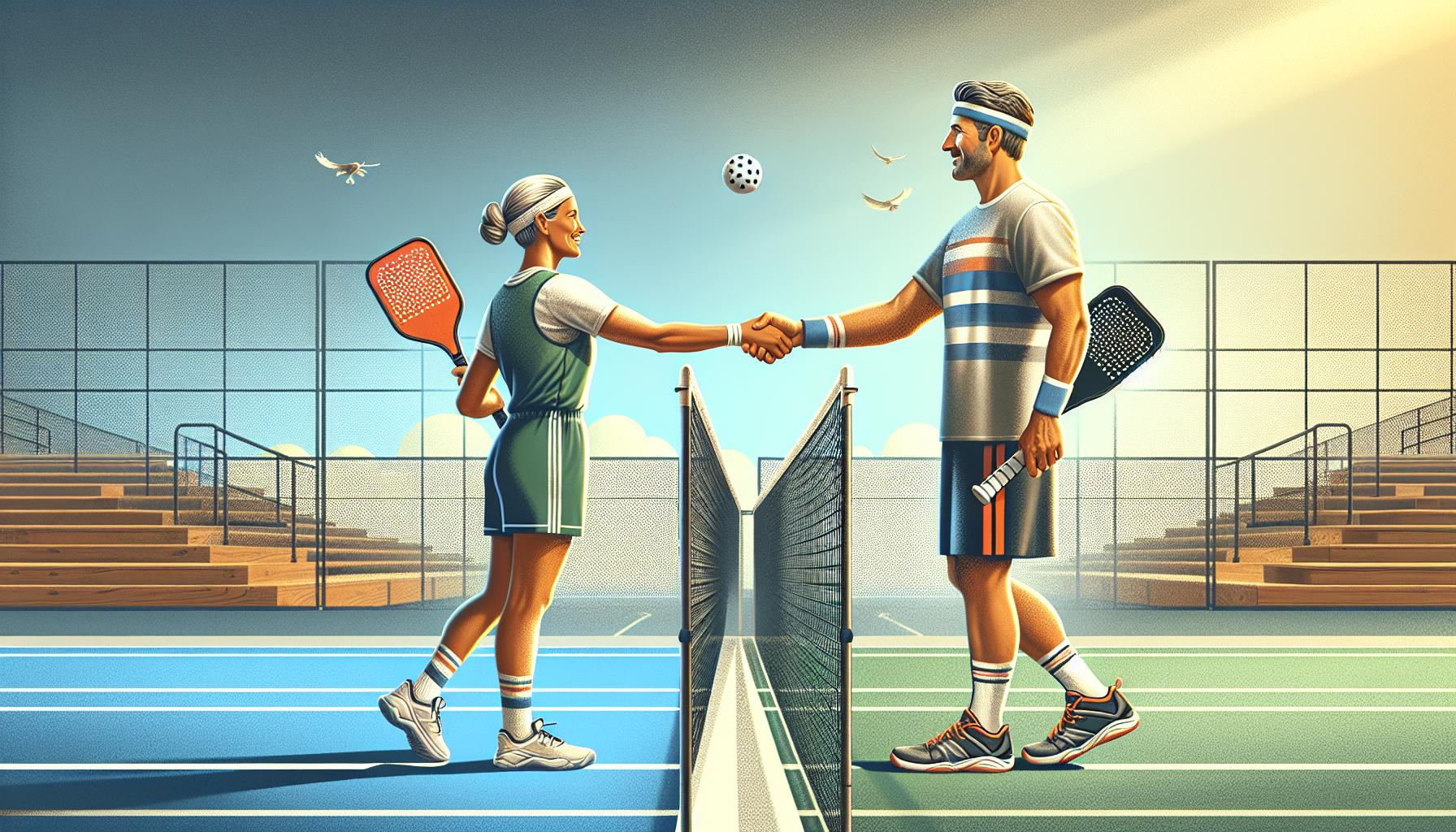
In the rapidly growing world of pickleball, fostering a culture of sportsmanship is paramount. This not only enhances the experience for players and spectators alike but also sets a standard for behavior that ensures the game remains enjoyable and welcoming for everyone involved. At the heart of promoting sportsmanship lies the responsibility of both players and organizers.
Players carry the torch of sportsmanship through their actions on and off the court. It starts with the basic acknowledgment and respect for opponents, officials, and the rules of the game. A handshake or a friendly nod before and after matches, although small gestures, play a significant role in setting a positive tone for the competition. Moreover, accepting calls and decisions with grace, even in the heat of the moment, exemplifies true sportsmanship.
On the other side of the net, organizers and officials have a crucial role in cultivating an environment that values fair play and respect. By setting clear expectations for behavior and swiftly addressing violations, they send a strong message about the importance of sportsmanship. Educational programs and workshops on the spirit of the game can be impactful tools in reinforcing these values.
The benefits of a strong sportsmanship culture in pickleball extend beyond the courts. It fosters a community where players feel valued and respected, encouraging continuous participation. Moreover, it attracts new players to the sport, ensuring its growth and sustainability.
Indeed, the impact of sportsmanship on the game of pickleball cannot be overstated. As the sport continues to expand, both in popularity and professionally, the emphasis on respectful conduct and fair play will be crucial in shaping its future. Through collective efforts in promoting a culture of respect and integrity, pickleball can maintain its status as a sport that’s not only competitive but also profoundly enriching for all involved.
In essence, upholding and advocating for sportsmanship in pickleball is a shared endeavor. Players, coaches, organizers, and spectators all play a part in this important aspect of the game. By embracing the principles of fair play and mutual respect, the pickleball community can look forward to a future where the spirit of sportsmanship shines as brightly as the competitive spirit of the game itself.
Conclusion
Upholding sportsmanship in pickleball isn’t just about following the rules; it’s about building a community that everyone enjoys being part of. When players, coaches, and organizers come together to promote respect and fair play, they create an environment where the spirit of the game shines brightest. This collective effort ensures that pickleball remains a sport beloved by all, marked by moments of camaraderie and friendly competition. Let’s keep the ball rolling in the right direction, fostering a culture where sportsmanship is the true winner.

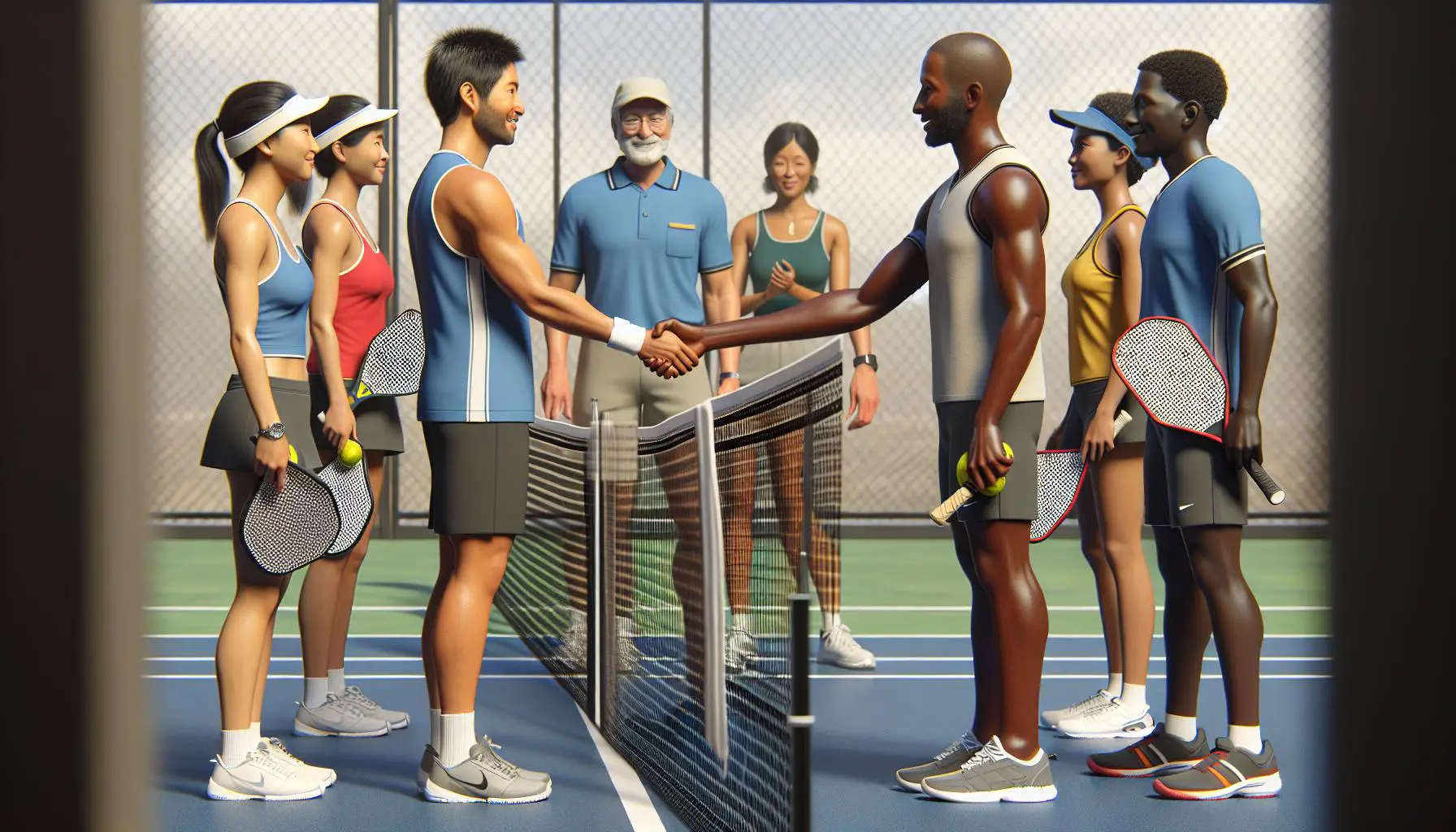






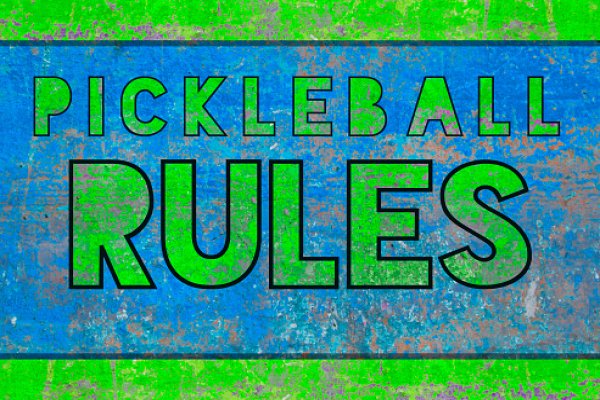
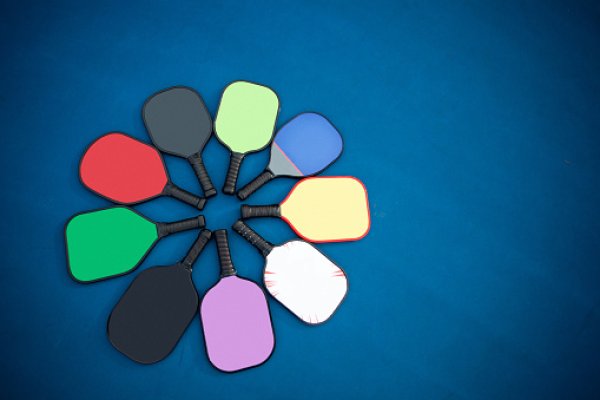
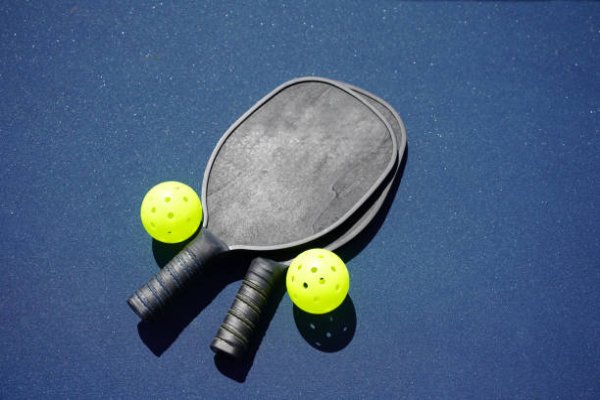



0 Comments